EXPERT
Locations
DOWNLOAD
Transregional Threats Journal
Venezuela Series • Issue 6
The Venezuelan Conundrum: Why negotiations continue to fail
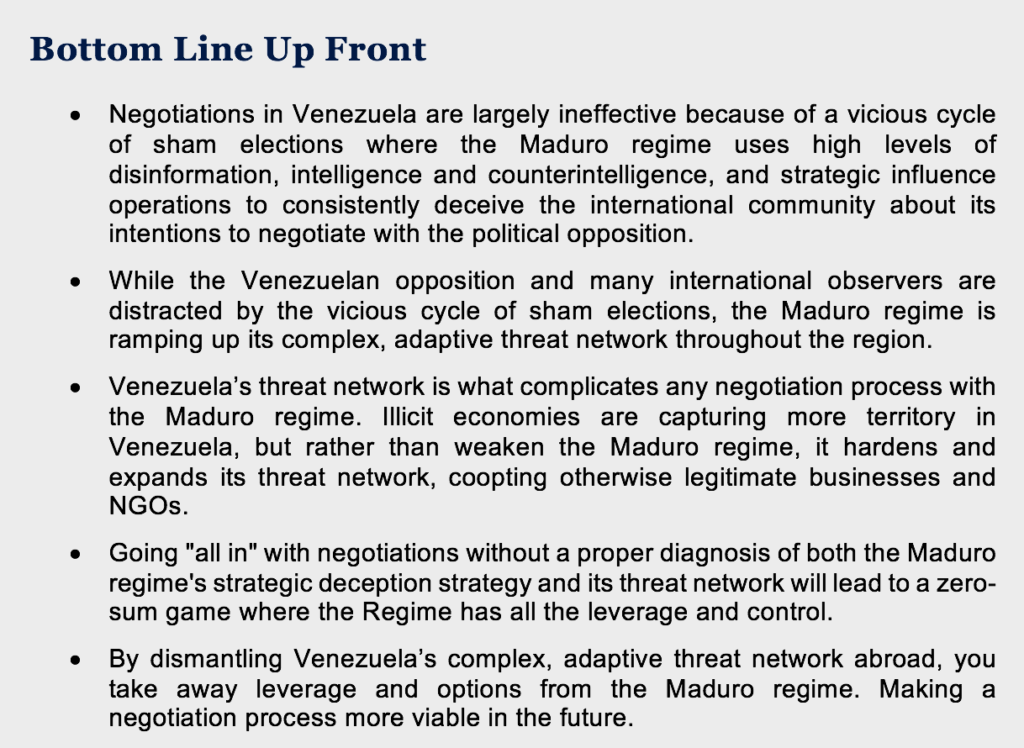
Venezuela has reached another crossroads. Interim President Juan Guaido recently presented a proposal to the Venezuelan people for renewed negotiations with the Maduro regime to reach the evasive goal of free and fair elections in a country undergoing the worst humanitarian crisis in the Western Hemisphere.[i] Nicolás Maduro responded by demanding three pre-conditions to any negotiations: 1) lifting of all sanctions; 2) recognizing the Regime as a legitimate power; and 3) access to seized and frozen funds abroad.[ii]
Many Venezuelans, both in the country and abroad, remain skeptical of further dialogue and negotiations with the Maduro regime. In the past, the Regime has repeatedly used negotiations as a stalling tactic, further dividing the political opposition and distracting the international community.
In May 2019, the Oslo/Barbados negotiation began, mediated by the Norwegian Foreign Ministry. A few months later, Guaido announced that the talks failed, and the Maduro regime walked away.[iii] Since then, the Venezuelan opposition has lost control of the National Assembly and some support from the international community. Several European States no longer recognize Guaido (nor Maduro) as the country’s legitimate head of state.[iv] Meanwhile, the return to power of the Movement Toward Socialism (MAS) in Bolivia and the Fernandez government in Argentina have allowed the Maduro regime to recover lost regional allies.
The question then is not whether a negotiation should take place—it should—but at what cost and under what conditions? More importantly, how do negotiations play into a larger strategy of strategic deception by the Maduro regime? And what is the analytical construct of such a strategy that allows the Maduro regime to dangle the empty prospect of “free and fair” elections in Venezuela? The analysis begins with a detailed understanding of how the Maduro regime perpetuates a vicious cycle of negotiations that lead to sham elections.
THE VICIOUS CYCLE OF SHAM ELECTIONS
For the last two decades, the Chavista government has perfected its ability to use high levels of disinformation, intelligence and counterintelligence, and strategic influence operations to consistently deceive the international community about its intentions to negotiate with the political opposition. This has allowed analysts to understand a cyclical pattern and multi-step process to the Maduro regime’s current strategic deception. Each step must be analyzed in the full context of the ‘vicious cycle’ to understand how and why history repeats itself with failed negotiations in Venezuela.
The cycle begins with the false promise of free elections, followed by new rules imposed by the Maduro regime.[v] An angered opposition then calls for protests,[vi] and then the Regime does what it does best, violent repression.[vii] This leads to more dialogue and negotiations[viii] and the ‘vicious cycle’ closes the loop by holding, once again, sham elections in Venezuela.[ix]
Essentially, the Maduro regime systematically steers the opposition into a false sense of confidence that results in social and political unrest once the negotiation process breaks down. The Bolivarian Revolution has been playing this infinite game of sham elections and dialogue and negotiations in Venezuela for twenty-two years.
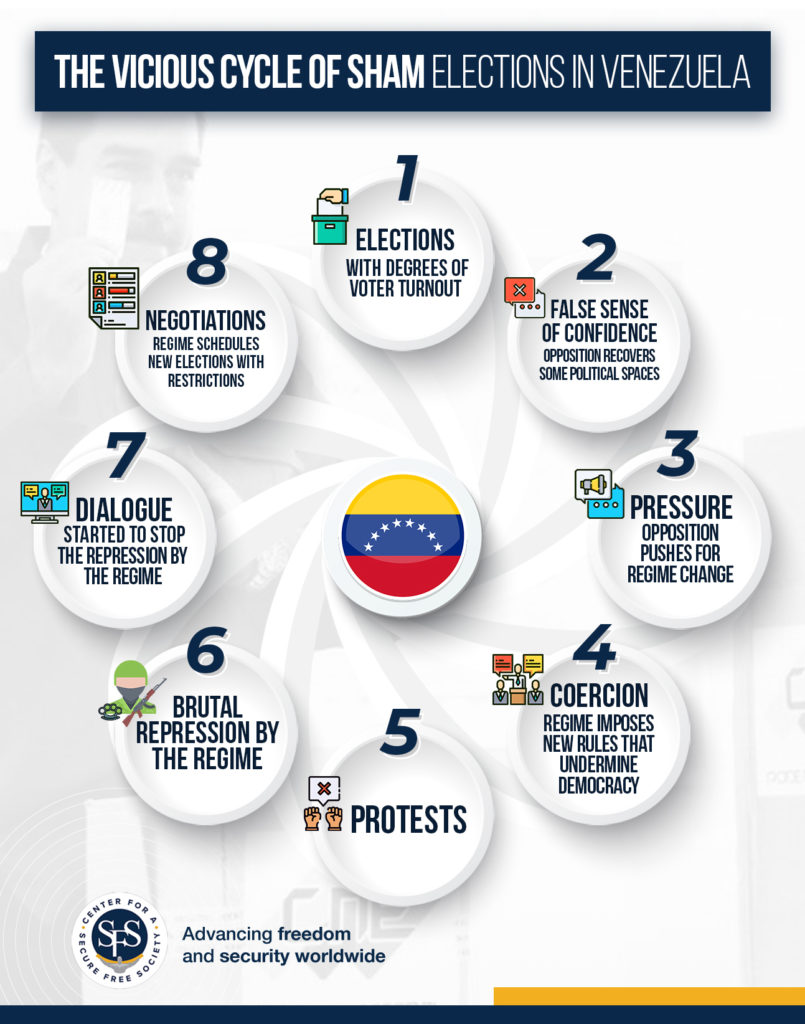
The last full ‘vicious cycle’ of sham elections in Venezuela began in 2015, with the National Assembly elections. After months of campaigning, the Venezuelan opposition recovered the two-thirds majority needed in the legislature to work toward an eventual electoral reform.[x] The response from the Maduro regime was to use the outgoing legislators to stack the Supreme Court with loyalists.[xi] Then erect a parallel legislative structure called the Constituent Assembly, made up entirely of the Regime’s supporters.[xii]
In essence, the Maduro regime laid a trap for the Venezuelan opposition, amped by the false sense of confidence after the electoral victory in the 2015 legislative elections. Once realizing they were duped, Venezuelan opposition members organized massive protests in 2017 that resulted in brutal repression and human rights violations by the Maduro regime, killing an estimated 157 people and arresting more than 5,300.[xiii] The international community, mostly unaware of the Regime’s manipulations, called for more dialogue to stop the repression, leading to the negotiations in the Dominican Republic sponsored by Spanish Prime Minister Jose Luis Rodríguez Zapatero which failed in February 2018.[xiv]
But the failed Dominican Republic negotiations paved the way for the Maduro regime to hold another sham election with, once again, new rules that violate the constitutional role of the electoral authorities. This was the 2018 presidential election,[xv] which the Venezuelan opposition did not recognize.[xvi] The ‘vicious cycle’ completed with the 2020 National Assembly sham elections, where the Maduro regime regained an overwhelming legislative majority. Not surprisingly, the Regime then dissolved the Constituent Assembly because it served its purpose of gas-lighting the Venezuelan opposition.[xvii]
Now, Nicolás Maduro remains president until 2024, with more than 90 percent of the National Assembly made up of deputies within the Regime’s control or influence.[xviii] Meanwhile, the Venezuelan opposition is increasingly fractured and divided, with significantly less popular support than when the cycle began in 2015. It seems, however, that the hard lessons of the ‘vicious cycle’ are not learned, as a “new” cycle is set to repeat this November 2021 with the upcoming gubernatorial elections in Venezuela.
DECODING VENEZUELA’S THREAT NETWORK
While the Venezuelan opposition and many international observers are distracted by the ‘vicious cycle’ of sham elections, the Maduro regime ramps up its threat network. The Regime’s primary focus is not negotiations nor elections, but rather consolidating a complex adaptive threat network in Venezuela that projects asymmetric power abroad.[xix]
The Venezuelan threat network is comprised of “adaptive agents,” which are individuals and entities capable of interacting with each other in dynamic, often nonlinear, ways.
The most important aspect of these adaptive agents is that they operate autonomously in both illicit activities and legitimate business, without a command-and-control structure, but coherently enough to recognize that their survival is connected to the survival of the Maduro regime. The mutual dependency supersedes any ideological or cultural differences and allows for a balance between autonomy and purpose. This is the essence of the Venezuelan threat network, which is decentralized and distributed horizontally throughout society. It is one of the main reasons the Maduro regime persists in power despite international pressure.
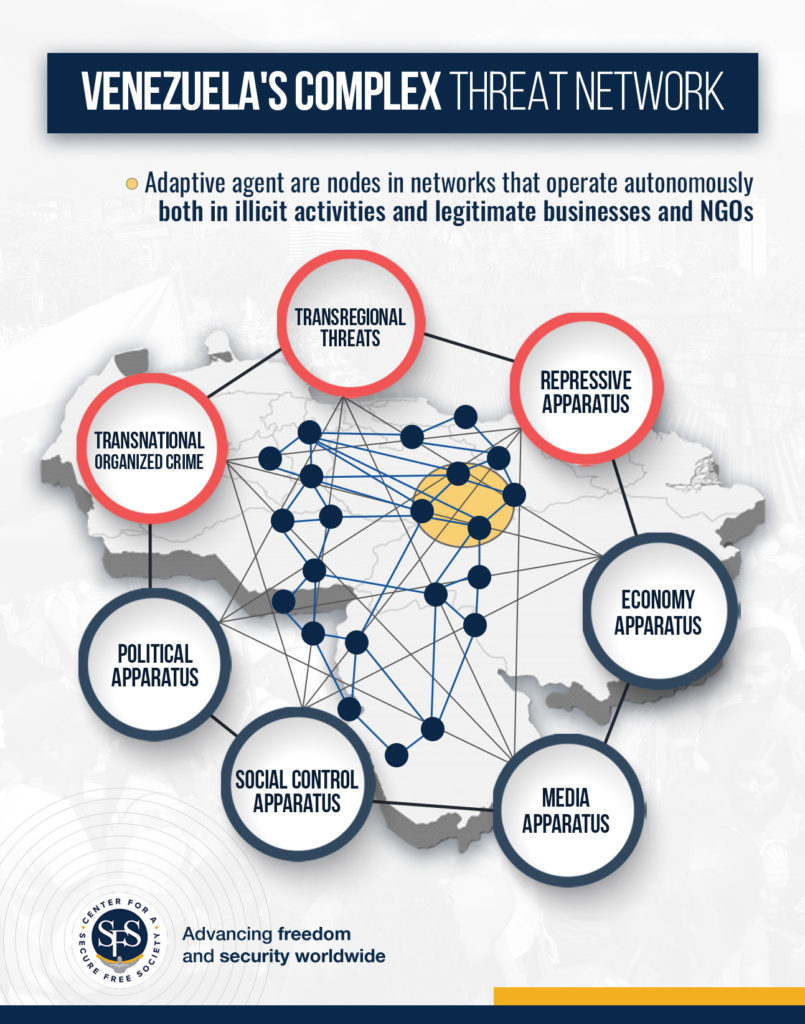
Threat convergence depends on robust logistical networks that expand the scope and reach of various illicit actors without the need for a vertical command and control structure.[xx] This logistical network is powered by illicit economies, such as trafficking, laundering, smuggling, counterfeiting, etc., that are growing in both size and importance in Venezuela. Illicit economies are capturing more territory in Venezuela, but rather than weaken the Maduro regime, it hardens and expands the threat network. It provides more tools and opportunities to co-opt parts of the Venezuelan private sector and civil society while providing plausible deniability for the Maduro regime. The threat network blends illicit activities with legitimate businesses and NGOs that are engaged in key sectors and industries, such as energy, gold, transportation, communications, and humanitarian aid.
According to Ecoanalítica, a Venezuelan corporate finance consultant, more than $6 billion in U.S. currency is circulating within Venezuela, linked to three illicit economies: gold smuggling, oil smuggling, and drug trafficking.[xxi] With the world’s highest inflation rate, Venezuelan businessmen have taken advantage of the much-needed cash flow in the illicit economies to create new U.S. dollar-only shops known as “bodegones,” providing many toiletries, food items, and other imports that became impossible to find during Venezuela’s economic implosion.[xxii] The otherwise neutral businesses and NGOs in Venezuela are coopted by the Maduro regime to build out political, economic, social, and communication apparatus that give the Regime a safety valve in the face of international pressure, particularly sanctions. They become adaptive agents in Venezuela’s threat network.
Some of these adaptive agents function as intermediaries between legitimate business, illicit actors, and the Maduro regime. A prominent Venezuelan business or NGO can appear legitimate to the untrained eye, but, beneath the surface, be subverted or coopted by the Maduro regime to expand its threat network.
Such is the case with Globovisión, a 24-hour television news network that was once considered the gold standard for Venezuelan media. [xxiii] In 2013, Globovisión was sold to three businessmen who changed the editorial line to be less critical of the Regime.[xxiv] One of the new owners, Raúl Gorrín, operated for years within the shadows of the Maduro regime and the Venezuelan opposition until August 2018 when the U.S. Justice Department charged Gorrín with money laundering and violating the foreign corrupt practices act.[xxv] Charges that were expanded the following year, in November 2019, when U.S. Immigration and Customs Enforcement (ICE) [xxvi] added Gorrín to its Most Wanted List and the Treasury Department slapped sanctions on him, as well as the television network Globovisión, for being part of “a significant plot of corruption” through the use of the foreign currency exchange system of Venezuela.[xxvii] Today, Raúl Gorrín is generally known to be radioactive by the international community, however, still operates within a gray zone of business, media, and Regime activities.
The Globovisión case is just one of many in Venezuela where seemingly innocuous and legitimate business entities and NGOs turn out to be coopted by the Maduro regime to serve as adaptive agents in its overarching threat network.
The threat network is what complicates any negotiation process with the Maduro regime. The sheer size of the illicit economies in Venezuela has created conditions where far too many Venezuelan businessmen and others are complacent with corruption and neutral to the Maduro regime’s deceptive strategies, because, despite its opposition to the Regime, it needs to survive. And the Maduro regime has used its complex, adaptive threat network to establish antibodies to any pressure mechanism critical to a successful negotiation.
A lesson from Syria, a country with a similar humanitarian crisis and a strong ally of the Maduro regime, is that negotiations can result in a brutal authoritarian regime legitimizing itself through sham elections. On May 26, 2021, after a decade of civil war, Bashar Al-Assad “won” a fourth presidential term with more than 95 percent of the vote.[xxviii] The United Nations-led peace process and dialogue with the Syrian Regime tried to call for international electoral supervision but in effect only paved the way for Assad to legitimatize another sham election.
WHAT CAN BE DONE?
There is no silver bullet to collapse the Maduro regime. The most critical lesson from the last two years of the Trump administration’s maximum pressure strategy is that the Maduro regime survives because of its transnational and transregional threat network, which provides the Regime the oxygen it needs to withstand robust international pressure.
Going “all in” with negotiations without a proper diagnosis of both the Maduro regime’s strategic deception strategy and its threat network will lead to a zero-sum game where the Regime has all the leverage and control. Incorporating civil society, the military, or other non-traditional actors into the negotiations will likely result in the Maduro regime finding additional levers to steer negotiations in its preferred direction. But most importantly, after twenty-two years, the experience and tools are there to understand how the Chavista regime uses negotiations and sham elections to legitimize itself within the international community.
There is no quick solution to the crisis in Venezuela but identifying what not to do can be more valuable than doing more of the same. Without negotiations as a viable near-term solution, it may seem that the Venezuela cause is lost. Yet, if we appreciate the complexity of Venezuela’s threat network and understand the Maduro regime’s regional strategy, then another option persists.
The most immediate course of action is to dismantle the threat network outside of Venezuela.
More than coronavirus vaccines or humanitarian aid, the Venezuelan people have been pleading with the international community to help them dislodge a totalitarian regime. But it’s not until many failed attempts by Venezuelans to topple the Maduro regime from within, that it becomes clear that the path toward a new Venezuela rests in taking away the Regime’s options in its near abroad.
It begins with going back to the drawing board and working with regional governments and civil society in Latin America and the Caribbean to locate, identify, and neutralize the adaptive agents of the Venezuelan threat network that exist in their countries. By dismantling Venezuela’s complex, adaptive threat network abroad, you take away leverage and options from the Maduro regime. But more importantly, you make a more effective negotiation process more viable in the future.
[i] Alex Vasquez, “Guaido Urges Venezuela Election Deal and Sanctions as Spur,” Bloomberg, May 11, 2021, https://www.bloomberg.com/news/articles/2021-05-11/guaido-urges-venezuela-electoral-deal-and-sanctions-as-incentive
[ii] Naky Soto, “Maduro: You Want to Negotiate? These Are My Conditions,” Caracas Chronicles, May 27, 2021, https://www.caracaschronicles.com/2021/05/27/maduro-you-want-to-negotiate-these-are-my-conditions/
[iii] Reuters Staff, “Venezuela’s Opposition Says Norway-Mediated Dialogue with Maduro ‘Is Finished,’” Reuters, September 16, 2019, https://www.reuters.com/article/us-venezuela-politics-idUSKBN1W100J.
[iv] Robin Emmott, “EU No Longer Acknowledges Venezuela’s Guaido as Interim President,” Reuters, January 6, 2021, https://www.reuters.com/article/us-venezuela-election-eu-idUSKBN29B2A9.
[v] “Venezuela: Rulings Threaten Free and Fair Elections,” Human Rights Watch, July 7, 2020, https://www.hrw.org/news/2020/07/07/venezuela-rulings-threaten-free-and-fair-elections.
[vi] Rafael Romo and Marilia Brocchetto, “Venezuela Protests: What You Need to Know,” CNN, April 18, 2017, https://www.cnn.com/2017/04/18/americas/venezuela-protest-explainer/index.html.
[vii] OHCHR, “Venezuela: Human Rights Violations Indicate ‘Policy to Repress’ – UN Report,” August 30, 2017, https://www.ohchr.org/EN/NewsEvents/Pages/DisplayNews.aspx?NewsID=22007&LangID=E.
[viii] Reuters Staff, “Venezuela’s Opposition Says Norway-Mediated Dialogue with Maduro ‘Is Finished,’” Reuters, September 16, 2019, https://www.reuters.com/article/us-venezuela-politics-idUSKBN1W100J.
[ix] Ryan Dube, “Venezuela’s Regime Challenges Biden with Sham Election,” Wall Street Journal, December 5, 2020, https://www.wsj.com/articles/venezuelas-regime-challenges-biden-with-sham-election-11607180401.
[x] Anatoly Kurmanaev, “New Venezuela Assembly Leader Henry Ramos Allup Pulls No Punches,” Wall Street Journal, January 27, 2016, https://www.wsj.com/articles/new-venezuela-assembly-leader-henry-ramos-allup-pulls-no-punches-1453890624.
[xi] Kejal Vyas and Anatoly Kurmanaev, “Maduro’s Allies Stack Venezuela’s Supreme Court,” Wall Street Journal, December 23, 2015, https://www.wsj.com/articles/maduro-s-allies-stack-venezuelas-supreme-court-1450912005.
[xii] “No Room for Debate: The National Constituent Assembly and the Crumbling of the Rule of Law in Venezuela,” International Commission of Jurists, July 2019, https://www.icj.org/wp-content/uploads/2019/07/Venezuela-No-room-for-debate-Publications-Reports-Fact-finding-mission-reports-2019-ENG.pdf.
[xiii] “Crackdown on Dissent,” Human Rights Watch, November 29, 2017, https://www.hrw.org/report/2017/11/30/crackdown-dissent/brutality-torture-and-political-persecution-venezuela.
[xiv] Jorge Pineda, “Venezuela Government, Opposition Resume Talks in Dominican Republic,” Reuters, January 12, 2018, https://www.reuters.com/article/us-venezuela-politics-idUSKBN1F12NC.
[xv] The Editorial Board, “Venezuela’s Sham Election,” The New York Times, May 21, 2018, https://www.nytimes.com/2018/05/21/opinion/venezuela-maduro-sham-election.html.
[xvi] Brian Ellsworth and Vivian Sequera, “Norway Says Venezuela Opposition and Government Talks to Continue,” Reuters, July 12, 2019, https://www.reuters.com/article/us-venezuela-politics-idUSKCN1U61XX.
[xvii] Elena Pavlovska, “Venezuela to Dissolve Its National Constituent Assembly,” Constitution Net, December 21, 2020, https://constitutionnet.org/news/venezuela-dissolve-its-national-constituent-assembly.
[xviii] Ciara Nugent, “Maduro’s Grip on the System Is Now Total. Venezuela’s Opposition Faces Uncertain Future After Parliamentary Elections,” Time, December 7, 2020, https://time.com/5918527/venezuela-parliamentary-elections-maduro/.
[xix] Complex Adaptive Systems (CAS) can change and reorganize their components to adapt to the problems posed by their environment. One of the main reasons why CAS is challenging to understand, and control is because they constitute a “moving target.”
[xx] Jose Gustavo Arocha & Joseph M. Humire, “Venezuela’s Crime-Terrorist Convergence,” Center for a Secure Free Society, August 12, 2020, https://www.securefreesociety.org/research/venezuelas-crime-terrorist-convergence/.
[xxi] Venezuela Investigative Unit, “Is There a Link Between the Dollarization of Venezuela and Organized Crime?” Insight Crime, October 24, 2019, https://insightcrime.org/news/analysis/dollarization-venezuela-organized-crime/.
[xxii] Shaylim Valderrama and Sarah Kinosian, “Costco in Caracas: How Florida Goods Flood Venezuelan Stores,” Reuters, December 16, 2019, https://www.reuters.com/article/us-venezuela-shops-idCAKBN1YK16X.
[xxiii] Deisy Buitrago and Corina Pons, “Under State Pressure, Venezuela TV Limits Live Coverage of Protests,” Reuters, May 27, 2017, https://www.reuters.com/article/us-venezuela-politics-media-idUSKBN18M2DP.
[xxiv] Chris Kraul and Mery Mogollon, “Venezuela’s Last Major Opposition TV Station Is Sold,” Los Angeles Times, May 14, 2013, https://www.latimes.com/world/la-xpm-2013-may-14-la-fg-venezuela-globovision-20130515-story.html.
[xxv] “United States v. Raul Gorrin Belisario, Docket No. 18-CR-80160-WPD,” U.S. Department of Justice, December 14, 2018, https://www.justice.gov/criminal-fraud/fcpa/cases/raul-gorrin-belisario.
[xxvi] “Gorrin Belisario, Raul Antonio De La Santisima T,” U.S. Immigration and Customs Enforcement, accessed May 28, 2021, https://www.ice.gov/most-wanted/gorrin-belisario-raul-antonio-de-la-santisima-t.
[xxvii] “Treasury Targets Venezuela Currency Exchange Network Scheme Generating Billions of Dollars for Corrupt Regime Insiders,” U.S. Department of the Treasury, accessed May 31, 2021, https://home.treasury.gov/news/press-releases/sm583.
[xxviii] “Syria’s Assad wins 4th term with 95% of vote, in election the West calls fraudulent,” Yahoo News, May 27, 2021, https://www.yahoo.com/news/syrias-president-bashar-al-assad-204729674.html

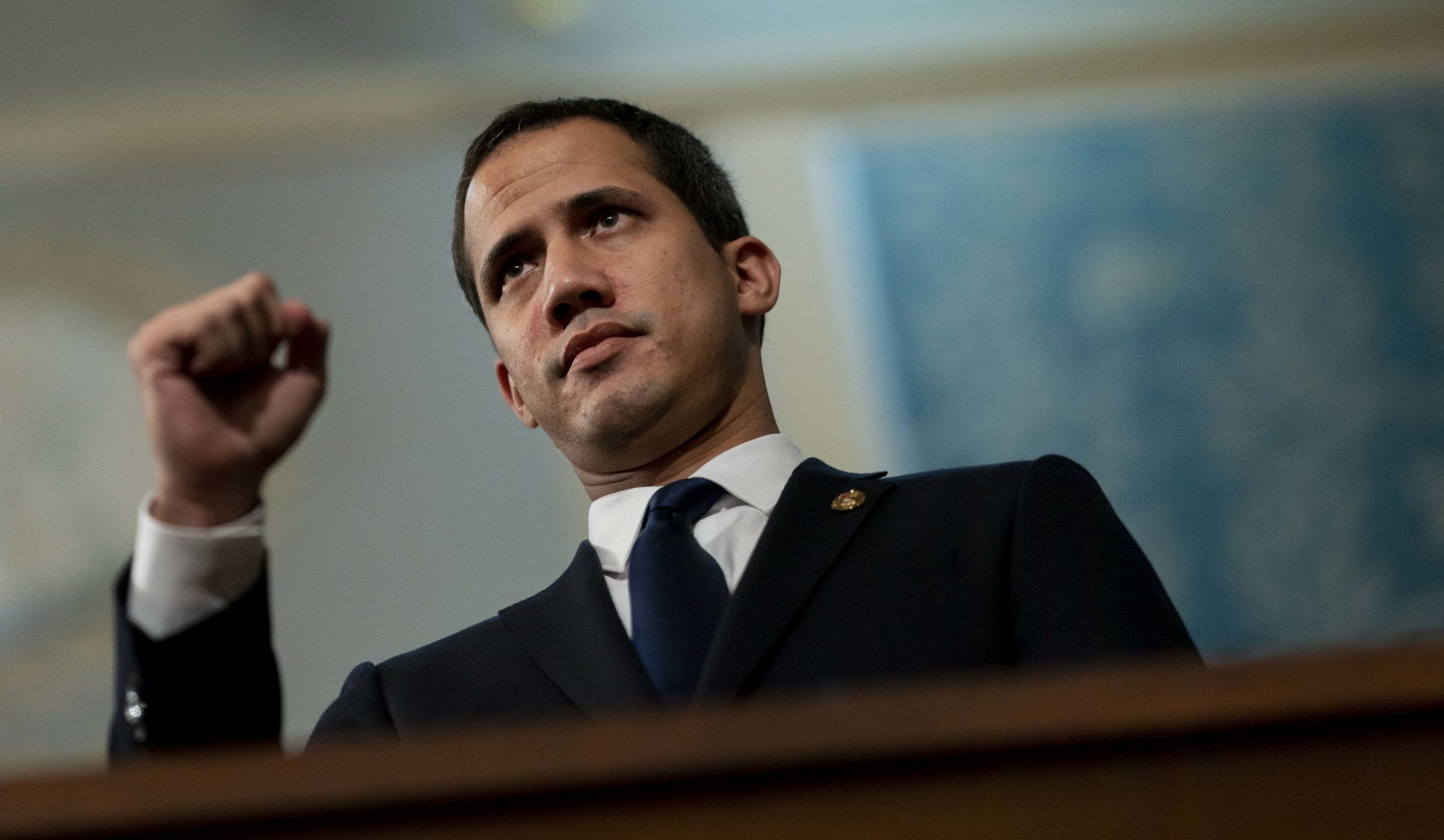
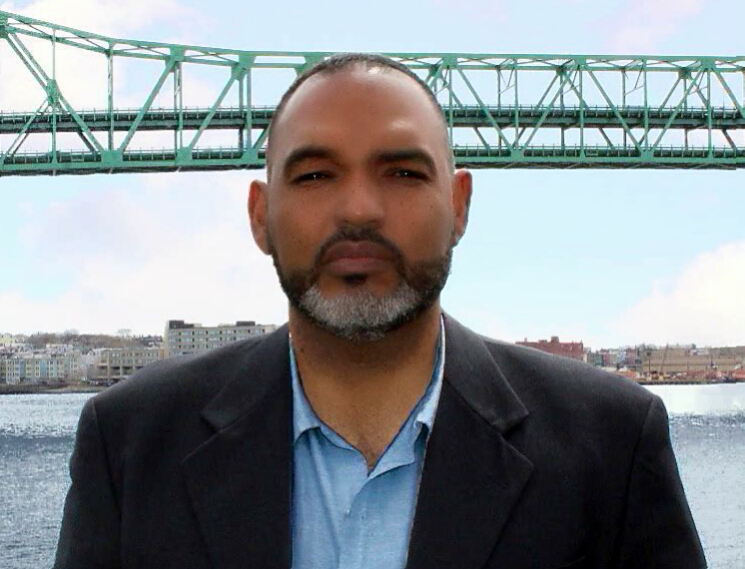 José Gustavo Arocha
José Gustavo Arocha